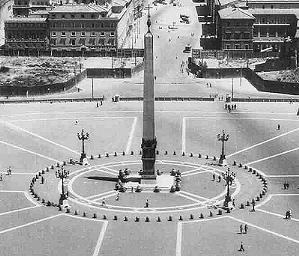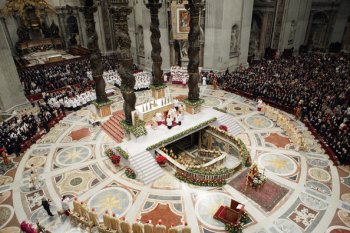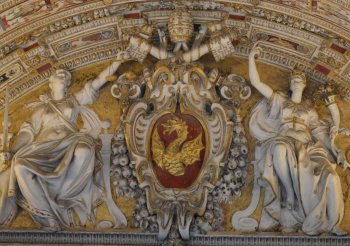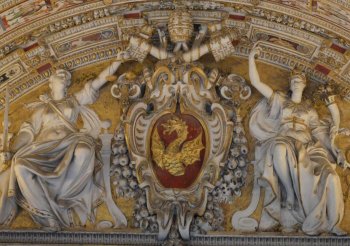B
brakelite
Guest
2.Not only do we have statements from Roman Catholic sources to the effect that the Papacy has the power of God, but the Pope also claims the right to be called “Holy Father”. Jesus warned the Jewish leaders of His day: “And call no man your father upon the earth: for one is your Father which is in heaven” (Matthew 23:9). In the light of this clear statement of Jesus, How can the Pope demand that he be called “Holy Father”? The name, Pope comes from the Italian, “Papa” which is an abbreviation of pater patruum which means “father of fathers” or “principal father” (See, Malachi Martin, The Decline and Fall of the Roman Church, p. 19).
3) The Pope allows people to approach him and bow before him and kiss his ring. In fact, Gregory VII, in his famous Dictatus Papae (Dictates of Hildebrand), article # 9 states: “That all princes should kiss his [the Pope’s] feet only.” (Cesare Baronius, Annales, year 1076, secs. 31-33, Vol 17 (1869 ed.), pp. 405, 406, translated). Acts 10:25-26 explains that Peter refused to allow Cornelius to bow before him. And supposedly, Peter was the first Pope!!! Even the angel Gabriel refused to allow John the Apostle to bow before him (see Revelation 19:10; 22:8-9). Jesus said to Satan on the Mount of Temptation, “Thou shalt worship the Lord thy God, and him only shalt thou serve”. How unlike Jesus is the Pope. Jesus washed the feet of His disciples but the Pope has encouraged people to bow before him and kiss his feet!!
4) The Papacy claims to possess the power to forgive sins. According to the Bible, only God can forgive sins (see Mark 2:7). If only God can forgive sins and the Pope claims to have power to forgive them, then the Pope must claim to be God! Not only does the Papacy claim that the Pope can forgive sins, but it also claims that its priesthood can forgive them. St. Alphonsus de Liguori wrote a book titled, Dignity and Duties of the Priest or Selva. Liguori lived in the mid 1700’s. What makes his book especially significant is that it is a compendium of the Roman Catholic “wisdom” of the previous 1500 years. Thus it presents with clarity, the official position of the Roman Catholic Church on the subject of the power and duties of the priesthood.
Before we look at several blasphemous statements from this book, it is important to understand the Roman Catholic view of the Mass.
In their view,
l) the priest has the power to change the bread into the real flesh of Jesus and the wine into His real blood,
2) Christ is contained in his totality (known as “ubiquity”) in each host distributed by the priest,
3) because Christ is totally present in each host, the host is worshiped by the priest and the faithful. Obviously, for these concepts to be true, the priest would have to exercise the powers of Almighty God. And this is just what the Roman Catholic Church believes.
Let’s listen to the words of St. Alphonsus de Liguori: “With regard to the power of the priests over the real body of Jesus Christ, it is of faith that when they pronounce the words of consecration the Incarnate Word has obliged himself to obey and to come into their hands under the sacramental species. We are struck with wonder when we hear that God obeyed the voice of Josue–The Lord obeying the voice of man–and made the sun stand when he said move not, O sun, towards Gabaon. , . . . and the sun stood still. But our wonder should be far greater when we find that in obedience to the words of his priests–HOC EST CORPUS MEUM–God himself descends on the altar, that he comes wherever they call him, and as often as they call him, and places himself in their hands, even though they should be his enemies. And after having come, he remains, entirely at their disposal; they move him as they please, from one place to another; they may, if they wish, shut him up in the tabernacle, or expose him on the altar, or carry him outside the church; they may, if they choose, eat his flesh, and give him for the food of others.” St. Alphonsus de Liguori, Dignity and Duties of the Priest or Selva, pp. 26-27.
“With regard to the mystic body of Christ, that is, all the faithful, the priest has the power of the keys, or the power of delivering sinners from hell, of making them worthy of paradise, and of changing them from the slaves of Satan into the children of God. And God himself is obliged to abide by the judgment of his priests, and either not to pardon or to pardon, according as they refuse or give absolution provided the penitent is capable of it. ‘Such is,’ says St. Maximus of Turin, ‘this judiciary power ascribed to Peter that its decision carries with it the decision of God.’ The sentence of the priest precedes, and God subscribes to it,’ writes St. Peter Damian.”St. Alphonsus de Liguori, Dignity and Duties of the Priest or Selva, pp. 27-28.
“Were the Redeemer to descend into a church, and sit in a confessional to administer the sacrament of penance, and a priest to sit in another confessional, Jesus would say over each penitent, ‘Ego te absolvo,’ the priest would likewise say over each of his penitents, ‘Ego te absolvo,’ and the penitents of each would be equally absolved.” St. Alphonsus de Liguori, Dignity and Duties of the Priest or Selva, p. 28.
“
“When he ascended into heaven, Jesus Christ left his priests after him to hold on earth his place of mediator between God and men, particularly on the altar. . . The Priest holds the place of the Saviour himself, when, by saying ‘Ego te absolvo,’ he absolves from sin.” St. Alphonsus de Liguori, Dignity and Duties of the Priest or Selva, p. 34
5) The Roman Catholic Papacy claims to have changed the law of God. (Dan.7:25 ) Not even God can change the law He wrote with His own finger (see Exodus 31:18). It is as eternal as He is. This means that the Papacy not only claims power equal to God’s but actually claims a power greater than God’s. Obviously this is blasphemy in its most odious form. Notice the following words from the Catholic Encyclopedia, vol. XII, art. “Pope,” p. 265: “Peter and his successors have power to impose laws both preceptive and prohibitive, power likewise to grant dispensation from these laws, and, when, needful, to annul them. It is theirs to judge offenses against the laws, to impose and to remit penalties. This judicial authority will even include the power to forgive sin. For sin is a breach of the laws of the supernatural kingdom, and falls under the cognizance of its constituted judges.”
This particular topic will be dealt with more fully a little later.
3) The Pope allows people to approach him and bow before him and kiss his ring. In fact, Gregory VII, in his famous Dictatus Papae (Dictates of Hildebrand), article # 9 states: “That all princes should kiss his [the Pope’s] feet only.” (Cesare Baronius, Annales, year 1076, secs. 31-33, Vol 17 (1869 ed.), pp. 405, 406, translated). Acts 10:25-26 explains that Peter refused to allow Cornelius to bow before him. And supposedly, Peter was the first Pope!!! Even the angel Gabriel refused to allow John the Apostle to bow before him (see Revelation 19:10; 22:8-9). Jesus said to Satan on the Mount of Temptation, “Thou shalt worship the Lord thy God, and him only shalt thou serve”. How unlike Jesus is the Pope. Jesus washed the feet of His disciples but the Pope has encouraged people to bow before him and kiss his feet!!
4) The Papacy claims to possess the power to forgive sins. According to the Bible, only God can forgive sins (see Mark 2:7). If only God can forgive sins and the Pope claims to have power to forgive them, then the Pope must claim to be God! Not only does the Papacy claim that the Pope can forgive sins, but it also claims that its priesthood can forgive them. St. Alphonsus de Liguori wrote a book titled, Dignity and Duties of the Priest or Selva. Liguori lived in the mid 1700’s. What makes his book especially significant is that it is a compendium of the Roman Catholic “wisdom” of the previous 1500 years. Thus it presents with clarity, the official position of the Roman Catholic Church on the subject of the power and duties of the priesthood.
Before we look at several blasphemous statements from this book, it is important to understand the Roman Catholic view of the Mass.
In their view,
l) the priest has the power to change the bread into the real flesh of Jesus and the wine into His real blood,
2) Christ is contained in his totality (known as “ubiquity”) in each host distributed by the priest,
3) because Christ is totally present in each host, the host is worshiped by the priest and the faithful. Obviously, for these concepts to be true, the priest would have to exercise the powers of Almighty God. And this is just what the Roman Catholic Church believes.
Let’s listen to the words of St. Alphonsus de Liguori: “With regard to the power of the priests over the real body of Jesus Christ, it is of faith that when they pronounce the words of consecration the Incarnate Word has obliged himself to obey and to come into their hands under the sacramental species. We are struck with wonder when we hear that God obeyed the voice of Josue–The Lord obeying the voice of man–and made the sun stand when he said move not, O sun, towards Gabaon. , . . . and the sun stood still. But our wonder should be far greater when we find that in obedience to the words of his priests–HOC EST CORPUS MEUM–God himself descends on the altar, that he comes wherever they call him, and as often as they call him, and places himself in their hands, even though they should be his enemies. And after having come, he remains, entirely at their disposal; they move him as they please, from one place to another; they may, if they wish, shut him up in the tabernacle, or expose him on the altar, or carry him outside the church; they may, if they choose, eat his flesh, and give him for the food of others.” St. Alphonsus de Liguori, Dignity and Duties of the Priest or Selva, pp. 26-27.
“With regard to the mystic body of Christ, that is, all the faithful, the priest has the power of the keys, or the power of delivering sinners from hell, of making them worthy of paradise, and of changing them from the slaves of Satan into the children of God. And God himself is obliged to abide by the judgment of his priests, and either not to pardon or to pardon, according as they refuse or give absolution provided the penitent is capable of it. ‘Such is,’ says St. Maximus of Turin, ‘this judiciary power ascribed to Peter that its decision carries with it the decision of God.’ The sentence of the priest precedes, and God subscribes to it,’ writes St. Peter Damian.”St. Alphonsus de Liguori, Dignity and Duties of the Priest or Selva, pp. 27-28.
“Were the Redeemer to descend into a church, and sit in a confessional to administer the sacrament of penance, and a priest to sit in another confessional, Jesus would say over each penitent, ‘Ego te absolvo,’ the priest would likewise say over each of his penitents, ‘Ego te absolvo,’ and the penitents of each would be equally absolved.” St. Alphonsus de Liguori, Dignity and Duties of the Priest or Selva, p. 28.
“
“When he ascended into heaven, Jesus Christ left his priests after him to hold on earth his place of mediator between God and men, particularly on the altar. . . The Priest holds the place of the Saviour himself, when, by saying ‘Ego te absolvo,’ he absolves from sin.” St. Alphonsus de Liguori, Dignity and Duties of the Priest or Selva, p. 34
5) The Roman Catholic Papacy claims to have changed the law of God. (Dan.7:25 ) Not even God can change the law He wrote with His own finger (see Exodus 31:18). It is as eternal as He is. This means that the Papacy not only claims power equal to God’s but actually claims a power greater than God’s. Obviously this is blasphemy in its most odious form. Notice the following words from the Catholic Encyclopedia, vol. XII, art. “Pope,” p. 265: “Peter and his successors have power to impose laws both preceptive and prohibitive, power likewise to grant dispensation from these laws, and, when, needful, to annul them. It is theirs to judge offenses against the laws, to impose and to remit penalties. This judicial authority will even include the power to forgive sin. For sin is a breach of the laws of the supernatural kingdom, and falls under the cognizance of its constituted judges.”
This particular topic will be dealt with more fully a little later.





